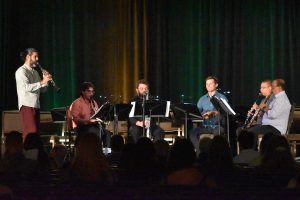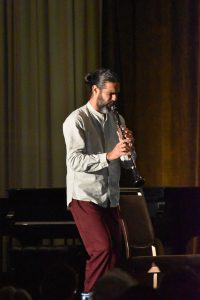
ClarinetFest® 2023 in Review
ClarinetFest® 2023 Day 4
ClarinetFest® @ Noon: Brazilian Choro Music
Lucas Andrade
by Angelina Gibson
 Choro music is a genre of Brazilian instrumental music that is lasting in its popularity with its components of virtuosity and improvisation. Blending influences of American Jazz, African, and Brazilian music, choro’s instrumentation consists of: one (or more) solo flutes, clarinets, mandolin, or sax) with cavaquinho (small Portuguese guitar), guitars, and pandeiro (Brazilian hand frame drum) as accompaniment. At ClarinetFest®, Brazilian clarinetist Lucas Andrade, the Quarteto de Clarinetes Sopros de PE, and pandeiro player Carl Dixion presented a thoroughly entertaining concert that was met with genuine enthusiasm from its audience.
Choro music is a genre of Brazilian instrumental music that is lasting in its popularity with its components of virtuosity and improvisation. Blending influences of American Jazz, African, and Brazilian music, choro’s instrumentation consists of: one (or more) solo flutes, clarinets, mandolin, or sax) with cavaquinho (small Portuguese guitar), guitars, and pandeiro (Brazilian hand frame drum) as accompaniment. At ClarinetFest®, Brazilian clarinetist Lucas Andrade, the Quarteto de Clarinetes Sopros de PE, and pandeiro player Carl Dixion presented a thoroughly entertaining concert that was met with genuine enthusiasm from its audience.
ClarinetFest® Artistic Director Dr. Wesley Ferreira met Lucas in his travels to Brazil last year and was determined to bring them to Denver—a decision much appreciated by all that experienced the concert. As the performers readied themselves before the concert, the group of musicians interacted as friends, a camaraderie that is both heard and seen as they warmed up together. Once Lucas, the Quarteto, and Dixion begin their program, the ballroom filled with intricate rhythms and engrossing improvisations. The selected repertoire were all compositions by Brazilian composers and arrangers, including Lucas’ own arrangement of Dorival Caymmi’s Maracangalha. Their music came into the audience in a way that it seemed wrong to sit still and was always met with eager applause. There was an infectious synergy between each of the musicians, as Lucas crafted absorbing solos that swirled with the diverse influences of choro.

Naquele tempo, which translates to “in that time,”—by the major Brazilian composers Pixinguinha and Bendito Lacerda—was a solo piece performed by Luca. As before, his playing attested to his virtuosity, but it ultimately embodied a dynamism and evident mastery of the choro style. A brief pause in the middle of Cuscuz de sete capas attested the audience could simply not hold back their applause until the end. The entire concert served as a celebration of friendship as well as music: Lucas expressed his sincere gratitude for the musicians who joined him for this occasion and the audience for their investment in their heritage. Pandeira player, Carl Dixion and Lucas stood across from each other for Choro Bolano in an enthralling exchange; Dixion’s fantastic solos especially sparkled with their complexity and technique alongside Lucas. Another memorable moment came in the second-to-last piece, Noites cariocas/1×0, as Lucas quoted familiar clarinet melodies, such as the first movement of Stravinsky’s Three Pieces, with a knowing look to the audience.
The bubbling atmosphere of the concert ended with the fantastically rapid Nilpolitano without a lull in their seemingly endless energy. At the piece’s conclusion, the audience immediately rose to a standing ovation, basking in the singular talent and ensemble they had spent the last hour with. Lucas again speaks of the important relationship between music and friendship, with the crucial link being between music and the heart. He had been playing choro music from a very young age and expressed appreciation for his listeners along with the opportunity to share it. Ending with “I hope to come back to the US,” and expressions of gratitude for Dr. Ferreira, the noontime concert ended in a cascade of applause, whistles, and cheers. The hour truly went by so very quickly and all of us wished we could experience it again.
Comments are closed.